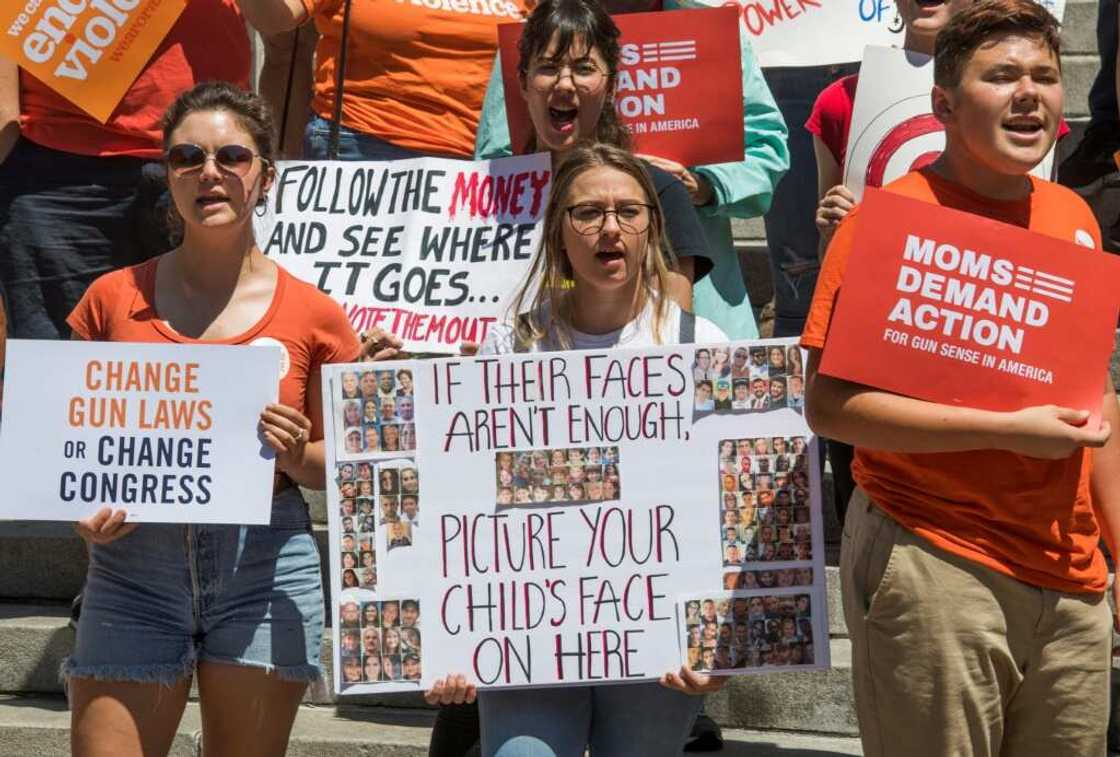US Senate advances breakthrough bill on gun safety

Source: AFP
PAY ATTENTION: Click “See First” under the “Following” tab to see Legit.ng News on your Facebook News Feed!
US senators advanced a bipartisan bill late Thursday addressing the epidemic of gun violence convulsing the country, approving a narrow package of new firearms restrictions and billions of dollars in mental health and school security funding.
The reforms -- which are almost certain to be rubber-stamped by the House of Representatives on Friday -- fall short of the demands of gun safety advocates and President Joe Biden, but have been hailed as a life-saving breakthrough after almost 30 years of inaction by Congress.
"This bipartisan legislation will help protect Americans," Biden said in a statement shortly after the Senate vote. "Kids in schools and communities will be safer because of it."
The Bipartisan Safer Communities Act, which was backed by all 50 Democratic senators and 15 Republicans, includes enhanced background checks for buyers under the age of 21, $11 billion in funding for mental health and $2 billion for school safety programs.
It also provides funding to incentivize states to implement "red flag" laws to remove firearms from people considered a threat.
And it closes the so-called "boyfriend" loophole, under which domestic abusers could avoid a ban on buying firearms if they were not married to or living with their victim.
PAY ATTENTION: Subscribe to Digital Talk newsletter to receive must-know business stories and succeed BIG!
"Tonight, the United States Senate is doing something many believed was impossible even a few weeks ago: we are passing the first significant gun safety bill in nearly 30 years," Senate Democratic majority leader Chuck Schumer said after the legislation passed.
"The gun safety bill we are passing tonight can be described with three adjectives: bipartisan, common sense, lifesaving."
His Republican counterpart Mitch McConnell said the legislation would make America safer "without making our country one bit less free."
"This is a common-sense package. Its provisions are very, very popular. It contains zero new restrictions, zero new waiting periods, zero mandates and zero bans of any kind for law-abiding gun owners."
The National Rifle Association and many Republicans in both chambers of Congress opposed the bill but it is endorsed by advocacy groups working in policing, domestic violence and mental illness.
The Senate and House are on a two-week recess starting next week but the Democratic-controlled House is expected to approve the Senate's bill with little drama before members leave town on Friday night.
'Historic day'
The breakthrough is the work of a cross-party group of senators who have been hammering out the details and resolving disputes for weeks.
The lawmakers had been scrambling to finish the negotiations quickly enough to capitalize on the momentum generated by the fatal shooting of 19 children in Uvalde, Texas and of 10 Black people at a supermarket in Buffalo, upstate New York, both last month.
Chris Murphy, the senator leading negotiations for Democrats, hailed a "historic day."
"This will become the most significant piece of anti-gun-violence legislation Congress has passed in three decades," he said on the Senate floor.
"This bill also has the chance to prove to the weary American public that democracy is not so broken, that it is able to rise to the moment."
The last significant federal gun control legislation was passed in 1994, introducing a national background check system and banning the manufacture for civilian use of assault rifles and large capacity ammunition clips.
But it expired a decade later and there has since been no serious movement on reform, despite rising gun violence.
Biden had pushed for more substantial reforms, including a reinstatement of the ban on assault rifles -- which were used in both the Texas and New York shootings -- and high-capacity magazines.
But the political challenge of legislating in a 50-50 Senate, where most bills require 60 votes to pass, means that more wide-ranging reforms are unrealistic.
"The morning after the tragedy in Uvalde, the United States Senate faced a choice," Schumer added.
"We could surrender to gridlock... Or we could choose to try and forge a bipartisan path forward to pass a real bill, as difficult as that may have seemed to many."
The vote came as a boon for gun safety activists hours after they were dismayed by a Supreme Court ruling that Americans have a fundamental right to carry a handgun in public.
The 6-3 decision struck down a more than century-old New York law that required a person to prove they had a legitimate self-defense need to receive a permit to carry a concealed handgun outside the home.
Source: AFP






